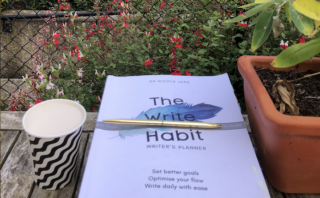November is a special month for writers around the world, as it brings with it two major writing challenges: NaNoWriMo and AcWriMo.
- NaNoWriMo (National Novel Writing Month) is a challenge for fiction writers to complete a 50,000-word novel in 30 days.
- AcWriMo (Academic Writing Month) is a sister challenge designed for academic writers who want to tackle academic papers, dissertations, or book chapters.
And as I’m sipping my tea, thinking about all those lofty goals I always have, I wonder: is it worth it? Should I get excited? Because, to be honest, those writing challenges can also backfire.
I’ve joined both NaNoWriMo and AcWriMo in the past. In some years, it worked really well! I’d finish an article or kickstart a book. But at other times — especially once kids arrived in my family — these challenges exploded my life (and I ended up frustrated).
So this year, I want to approach November with intention — and help you do the same. Instead of focusing solely on hitting big word counts, let’s think about what these challenges really offer.
Both NaNoWriMo and AcWriMo are about more than just meeting a writing goal; they’re about building momentum, pushing past procrastination, and connecting with a community of writers who are working toward similar dreams. But as motivating as these challenges can be, they also bring a common worry: Will I have enough time to do this, especially with the holidays around the corner?
Let’s walk through some key points to help you decide if NaNoWriMo or AcWriMo is right for you this year — without the overwhelm.
Ideally, you have pen and paper to journal, or think through my questions.
1. Picture Your Future Self Celebrating in December
This is my favourite exercise as a writer’s coach. Imagine how you’ll feel at the end of the year if you’ve made progress on that writing project you’ve been meaning to finish. Picture yourself in December celebrating your success — not because you cranked out an impossible number of words every day, but because you showed up consistently, even in small, intentional ways. You behaved like a writer.
Here’s your journaling question:
- How would you feel in December if you wrote consistently in November?
It’s not about having to “win” NaNoWriMo or AcWriMo. It’s about seeing the bigger picture: What would it feel like to enter the holiday season knowing you carved out time to make meaningful progress on your writing? That sense of accomplishment is powerful, and it’s something you can carry with you — not just into the new year, but into every future writing project.
If you think about your future self, cheering for what you’ve done, does that excite you? Does it feel worth it to take on this challenge, perhaps with a healthy adjustment?
Because the truth is, you don’t need to join.
And here’s the next thing you should be asking yourself.
2. Choose One Writing Priority for November
NaNoWriMo and AcWriMo have become synonymous with ambitious word counts, but here’s a secret: You don’t need to finish a novel or complete an entire research paper to make the most of November. Instead, ask yourself:
- What’s the one thing you’d love to accomplish before the end of the year?
- Can you make that small enough to fit your life? What would it look like if you were to cut this goal in half?
Maybe it’s finishing the first draft of a chapter, or revising 5 pages. Choose a writing goal that feels doable, something that excites you and brings you closer to completion.
The beauty of a “one thing” mindset — and specifically, “one small, doable thing” — is that it takes the pressure off and allows you to embrace November as a time to gain momentum. Whether you complete one chapter or the whole book, you’re still miles ahead of where you’d be if you hadn’t committed to showing up.
If you think you might be in, wait… here’s your fail-safe tip.
3. Set Flexible Writing Goals to Avoid Burnout
For many of us, November is a busy month with work, family, and holiday prep creeping in. If you’re an academic, you have students to support and teaching to get done. Rather than feeling the pressure to write daily, set yourself flexible goals that work with your schedule.
Here’s something to journal about:
- Could you aim for 2–3 focused writing sessions of 60min per week instead of stressing about hitting a word count every day?
- Could you reserve a couple of longer writing sessions on Saturday mornings, and make it a “4-Saturday Challenge” instead?
What’s important here is a doable plan for each week, and consistency, not perfection. Even if you don’t touch your manuscript for three days, you can come back on that fourth day with intention and purpose, knowing that other writers in the challenge are doing just the same (if they read this article…).
You’re still making progress. You’re still moving forward.
How do you feel right now, with this adjusted, calm approach to these writing challenges? (If you’re in, join my Facebook group to prep for November.)
It’s Not About the Word Count
NaNoWriMo and AcWriMo can be incredibly motivating, but only if you approach them with compassion and realistic expectations. I’ve seen it again and again as a writer’s coach that authors set high expectations, and drop out of the challenges half-way through because they didn’t have as much time as they thought. And I walked into that trap myself as well.
Remember, your writing journey is yours, and it doesn’t need to look like anyone else’s. Some writers thrive on the daily grind of high word counts, while others will benefit more from a gentler, flexible approach.
So, should you join? Only you can decide. But if ending the year with even a bit more writing done feels good, then say yes — on your terms.





